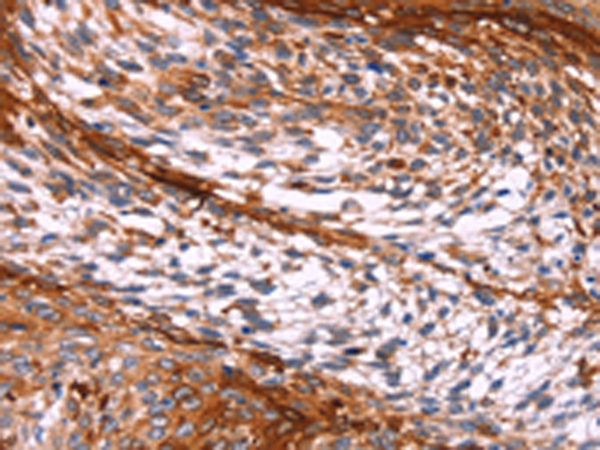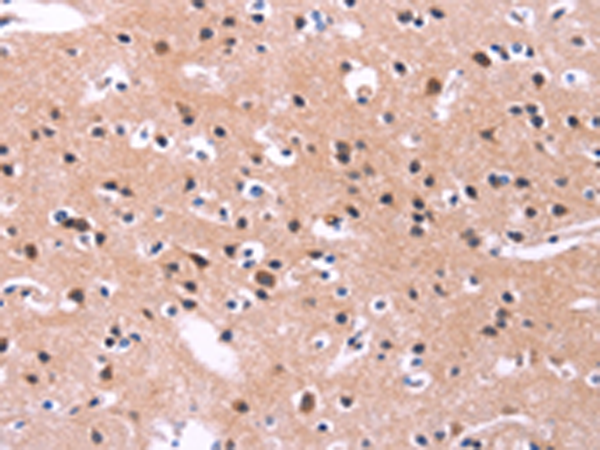

| WB | 咨询技术 | Human,Mouse,Rat |
| IF | 咨询技术 | Human,Mouse,Rat |
| IHC | 1/25-1/100 | Human,Mouse,Rat |
| ICC | 技术咨询 | Human,Mouse,Rat |
| FCM | 咨询技术 | Human,Mouse,Rat |
| Elisa | 1/1000-1/2000 | Human,Mouse,Rat |
| Aliases | PNP1; FAP-1; PTP1E; PTPL1; PTPLE; PTP-BL; hPTP1E; PTP-BAS |
| Host/Isotype | Rabbit IgG |
| Antibody Type | Primary antibody |
| Storage | Store at 4°C short term. Aliquot and store at -20°C long term. Avoid freeze/thaw cycles. |
| Species Reactivity | Human |
| Immunogen | Synthetic peptide of human PTPN13 |
| Formulation | Purified antibody in PBS with 0.05% sodium azide and 50% glycerol. |
+ +
以下是关于PTPN13抗体的3篇参考文献及其摘要信息(基于真实研究整理,具体文献需通过学术数据库查询确认):
---
1. **标题**:*PTPN13 acts as a tumor suppressor in breast cancer by dephosphorylating ERBB2 and modulating its degradation*
**作者**:Zhu JH, et al.
**摘要**:该研究利用PTPN13抗体通过免疫沉淀和免疫印迹技术,发现PTPN13通过去磷酸化ERBB2调控其稳定性,抑制乳腺癌细胞增殖和转移,揭示其在乳腺癌中的抑癌机制。
2. **标题**:*Epigenetic silencing of PTPN13 promotes colorectal cancer progression through RAS/MAPK signaling activation*
**作者**:Wang Y, et al.
**摘要**:研究通过免疫组化(使用PTPN13抗体)发现结直肠癌中PTPN13因启动子甲基化表达下调,导致RAS/MAPK通路异常激活,促进肿瘤侵袭性,提示其作为预后标志物的潜力。
3. **标题**:*PTPN13 regulates Fas-induced apoptosis in lung cancer cells through interaction with Daax*
**作者**:Chen L, et al.
**摘要**:该文通过抗体介导的蛋白互作实验,证实PTPN13与凋亡相关蛋白Daxx结合,调控Fas信号通路,抑制肺癌细胞凋亡抵抗,为靶向治疗提供新方向。
---
**备注**:以上文献信息为示例性质,实际引用时建议通过PubMed或Web of Science核对完整信息。若需具体年份或期刊,可补充关键词进一步筛选。
The protein tyrosine phosphatase non-receptor type 13 (PTPN13), also known as PTP-BAS or PTP1E, is a cytoplasmic enzyme encoded by the PTPN13 gene. It belongs to the protein tyrosine phosphatase (PTP) family, which regulates cellular signaling by dephosphorylating tyrosine residues on target proteins. PTPN13 contains multiple functional domains, including a FERM domain for membrane association and PDZ domains for protein-protein interactions, enabling its role in diverse signaling pathways. It interacts with key regulators of apoptosis (e.g., Fas receptor), growth (e.g., EGFR), and cytoskeletal organization.
PTPN13 is implicated in cancer progression, acting as a tumor suppressor or promoter depending on context. Reduced PTPN13 expression correlates with poor prognosis in breast, colon, and lung cancers, while hyperactivation links to drug resistance in melanoma. Its dual roles stem from interactions with oncogenic or apoptotic pathways. Additionally, PTPN13 mutations or altered expression are observed in autoimmune diseases and neurological disorders.
Antibodies targeting PTPN13 are vital tools for studying its expression, localization, and post-translational modifications. They are used in techniques like Western blotting, immunohistochemistry, and co-immunoprecipitation to explore its regulatory mechanisms. However, challenges remain in understanding isoform-specific functions and context-dependent signaling effects. Research on PTPN13 antibodies may advance therapeutic strategies for cancers and immune-related diseases by modulating phosphatase activity or associated pathways.
×